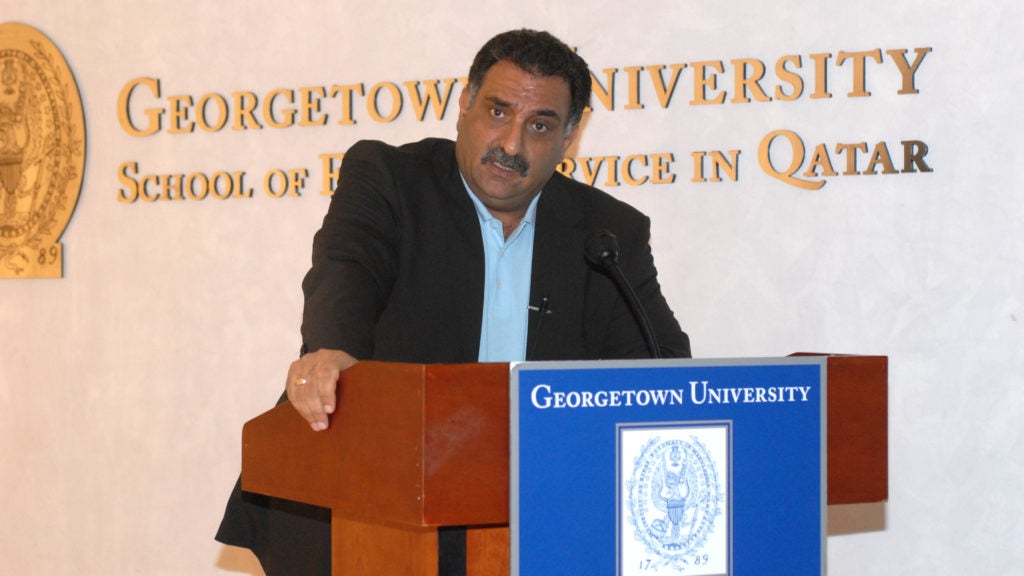Azmi Bishara Speaks on “The Palestinian Question” at Georgetown

Azmi Bishara spoke to students on the future on Palestine last week. The lecture was sponsored by the Doha Lecture Fund.
Doha, Qatar — On Wednesday 4 April 2008, the Doha Lecture Fund a student organization at the School of Foreign Service in Qatar (SFS-Qatar) hosted a lecture by Azmi Bishara in the Liberal Arts and Sciences Building at the Education City.Azmi Bishara is a former member of the Israeli Knesset (1996-2007) and a founding member of the Arab National Democratic Assembly representing the Arab minority in Israel under national democratic values. He was active in propagating the Palestinian cause during the second Intifada.Throughout the lecture entitled “Just Peace or Political Settlement”, Bishara attempted to analyze the Palestinian issue and then its possible solutions.”At the time when other national issues in the world are solved, why is the Palestinian issue becoming more complicated?” Bishara asked.Bishara explained that the complexity has to do with two different factors that, in his opinion, other national liberation movements did not face. The first factor is that the Palestinian issue was confused and intermingled with the plight of Jews in the Western world. The second factor he cited was that the Palestinian issue is closely tied to the “Arab Question,” which he defined as the continued separation of Arabs in political and ideological agendas and even national security matters. “The Palestinian issue also falls a victim to this multiplicity of Arab positions in the Middle East,” he said.The former Knesset member also drew a comparison between Palestinians and victims of colonial occupation. He said that the practices of the occupation in Palestine were classical colonialist practices of people who occupied land and expelled indigenous the people. “It is a colonial question. It is not a territorial dispute. It is not a religious conflict, and it is not a national conflict. It is a colonial question… from the Arab perspective the Zionist movement was part of the colonial project in the Middle East,” he explained.Bishara considers The Jewish National Zionist project as a unique kind of colonialism, which negates the people there. He explained that, from the beginning, the project sought to replace the people in Palestine and exclude them.He stressed that the Palestine issue is not the Issue of West Bank and Gaza. Bishara fears that Israel is taking such a direction in its dealing with the Palestinian issue. He thinks that such discussions do not look for a just solution but only political settlements.According to Bishara, now that the Palestinian population reached what has became a demographic danger in the view of the Israeli government and elite thought that if they do not give up the densely populated areas away, they would have a bi-national state de facto and that the Palestinian people will demand equal citizenship. The Israelis thought that they have to give up parts of the West Bank and Gaza and especially the densely populated areas.He said that Israel suggested to the Palestinian National Liberation movement a deal in which the Palestinian authority would take over the densely populated areas in return for having a Palestinian state. The deal ignores the refugee problem and asks Palestinians to give up on what the United Nations calls the inalienable rights of the Palestinian people. He considers the Israelis aimed at limiting solutions to the Palestinian Question by a bilateral deal, which leaves out the international community and the Arabs. According to Bishara, these are Israeli pre-conditions in order to accept the establishment of a Palestinian state.Bishara thinks that such a state will be reached. “It is unjust and it will not be legitimate even if it they reach it before the end of 2008,” he said. However, he also asserted that such as a state will not be accepted by the Palestinians, Arabs or refuges because it would be a political settlement subdued to a balance of forces and relinquishes Palestinian rights completely. “It will not lead to a just solution, it would lead to political settlement,” he concluded.Founded in 2006, the Doha Lecture Fund of Georgetown University’s School of Foreign Service in Qatar is student-based organization, which aims to provide a forum for the free exchange of speech and the promotion of dialogue.